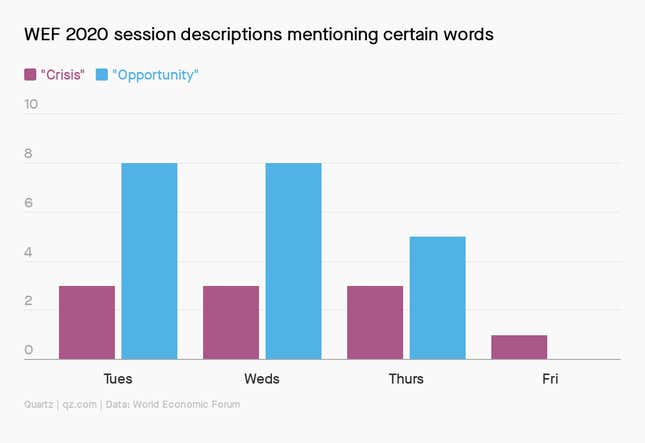Good morning delegates!
Trump has left town, following an impromptu press conference where he let loose on his enemies. After his lackluster keynote speech, the fiery exchange at least gave White House reporters in Davos their money’s worth. Speaking of money, by Quartz’s count the US administration’s two-day trip to the Alps cost American taxpayers at least $4 million, and likely much more.
Anyway, security lines and other disruptions should be reduced today. That doesn’t mean you can lower your guard—all that melted snow thanks to warm weather turns to sheets of ice overnight. Expect a high of 5°C (41°F) around midday.
What to watch for today
Less than zero. Klaus Schwab talks to Satya Nadella in the Salon at the Congress Center at 10:30 am. In terms of real, measurable action to improve the state of the world, the Microsoft boss might get quizzed on how the $1.3 trillion market cap company will go carbon negative by 2030. Still wrapping your head around negative emissions? Here’s our handy primer.
Countries in crisis. Davos feels far removed from the mass protests that have convulsed countries around the world recently, but three sessions will bring them to the forum. Venezuelan opposition leader Juan Guaidó—recognized as the country’s true president in more than 50 countries—gives a special address at 9:30 am, in a last-minute addition to the agenda. (His trip defies a travel ban, and he risks arrest upon his return.) At 1:00 pm, Lebanon’s foreign minister discusses “the return of Arab unrest,” and at 2:45 pm the president of the Kurdistan Regional Government talks to Iraq’s finance minister and the Saudi foreign minister on “an unsettled Middle East.”
The disunited states of Europe. On a day that’s likely to deliver some hard truths for the continent, at 11:15 am the Polish president, Turkey’s foreign minister, Italy’s minister for European affairs, and NATO’s secretary-general discuss the future of the “brain dead”—as France’s Emmanuel Macron put it—military alliance. German chancellor Angela Merkel and Italian prime minister Giuseppe Conte weigh in with keynotes later, at 2:15 pm and 4:00 pm, respectively. In the evening, the prime ministers of Georgia and Finland, ECB head Christine Lagarde, and representatives from the EU hold a dinner at the Kongress Hotel where they will discuss the goal of “uniting Europe.” (Easier said than done.)
Micah White, again (and again). Missed the co-founder of Occupy Wall Street’s talk yesterday? No problem. The activist—who has been ridiculed for his defense of mingling with elites—will speak on two panels today, at 12:30 pm and 2:30 pm. The first is on civil unrest in Latin America, with Ecuador’s foreign minister; the second is on “how to turn protest into progress,” with financier Bill Browder and Canadian indigenous teen activist Autumn Peltier.
The where-to-begin? session of the day. “An Evening with Sir Martin Sorrell and Anthony Scaramucci” at 5:00 pm at the YPO Hub.
The 50-year view. The last of Quartz’s “farsighted lunches” at the Hard Rock Chapel will predict what will become the most valuable resource in 2070. Asia deputy bureau chief Isabella Steger quizzes social entrepreneur Hilary Cottam (check out our recent profile of her work), Oxford and MIT futurist David Shrier, Columbia professor and author Tim Wu, and Quartz co-founder Kevin Delaney. If you want to come along—it starts at noon—drop us a line and say what you like best about Quartz’s Davos Daily Brief.
George Soros holds court. The billionaire philanthropist continues his tradition of hosting a dinner where he delivers a dystopian speech about the state of the world. Last year, Soros warned about the rise of China and Xi Jinping’s danger to open societies, and the year before he ripped into Donald Trump’s policies as well as the power of Big Tech.
Party planner. It’s many delegates’ last night in Davos, which generally means good business for the after-hours piano bars. Before it comes to that, we hear the Salesforce tiki lounge has Lenny Kravitz, while Cloudflare’s competing soirée targets a younger crowd with Jason Derulo. Wherever you find yourself, remember there is always a more exclusive party somewhere else in town, and you’re not invited.
Who won day two?
Thirty years after his last appearance here, Britain’s Prince Charles returned to Davos for the WEF’s 50th anniversary—lured, he said, by “the urgent need to shape the next 50 years.” To that end, he made a direct appeal to delegates to lend their “ingenuity and practical skills” to the tasks of rapid decarbonization and the transition to sustainable markets. He also met Greta Thunberg, who was born roughly 35 years after His Royal Highness made his first speech about the environment.
It will be a busy year for the prince, who said he’d be holding a series of roundtables on areas “including, but not limited to, aviation, water, carbon capture and storage, shipping, forestry, plastics, financing, digital technology, the bio economy, nature-based solutions, renewable energy, battery storage, electric vehicles, fisheries, integrated healthcare, cement, steel, traceability in labeling, and agriculture—at the end of which I shall probably be dead.” (The line earned a genuine laugh in the crowd.) For delivering a succinct, reasoned, and well-received message to take action, and for keeping a stiff upper lip and a sense of humor in the face of stress on the royal family recently and the planet generally, the winner of Davos on day two was Charles, Prince of Wales.
More highlights from yesterday
Awkward conversation topics. What panel discussion or keynote address could possibly compete with news of the apparent hacking of Jeff Bezos’ phone via malware embedded in a WhatsApp message from Saudi Arabia’s crown prince Mohammed bin Salman? It was the biggest talking point on the sidelines of Davos, though probably not in the many Saudi-sponsored lounges along the Promenade. Earlier reports of Russian spies (disguised as plumbers) laying the groundwork for hacking ops in Davos last year are somewhat tame by comparison.
Cool as ice. Finnish prime minister Sanna Marin—at 34, the youngest sitting head of state—held her own at a panel about the future of the Arctic, alongside Davos veteran Al Gore and a combative Scott Minerd, chief investment officer of Guggenheim Partners. Gore offered his congratulations to the recently installed prime minister, and said that she and other young people have values that he “admires so much.” Minerd dismissed “do-gooders” as ineffective.
Enjoying this email?
This is a special edition of the Quartz Daily Brief produced for attendees and others interested in the World Economic Forum in Davos. If you were forwarded this newsletter by a colleague, head of state, or Klaus Schwab himself, you can get your own copy delivered directly to your inbox for free by clicking here. And follow all of Quartz’s coverage from the forum during the week here.
Don’t believe the hype
Each day, we’re asking a different delegate whether the following people, things, and ideas are overhyped, underhyped, or properly hyped. Today’s contestant: Dmitry Konov, CEO of Russian petrochemical producer Sibur.
Blockchain: Overhyped. “The idea is great, the technology is mostly there, but the application of the concept to particular cases has been very poor.”
A four-day workweek: Overhyped. “But flexible working hours are properly hyped.”
Greta Thunberg: Overhyped. “She has her thoughts, observations, and worries—she’s right about many of them. There are also things that she doesn’t take into account. Some of the solutions that she’s calling for can bring a worse result for her aspirations.”
ESG investing: Properly hyped. “Maybe even underhyped, because I think it’s already the mainstream and will become more influential and important in the coming years—faster than people think.”
Chart interlude
Glass half full. Despite a somewhat somber mood around the Congress Center this week, the official program suggests there isn’t so much to be worried about.

Seen and heard
Coat-check chatter with a CEO: Fellow chief execs have grumbled to him about a dearth of sessions about the economy this year, but he reckons that’s a good thing because when the economy dominates Davos it’s usually after something has gone really wrong.
“As a social scientist, every time I heard the word ‘millennials,’ I immediately start to get skeptical.”—Adam Grant, Wharton organizational psychologist, suggesting our differences have more to do with age than generation.
How good is the grub at the Japan Night buffet? More than a few government ministers—who could surely arrange a free dinner anywhere in town—were seen hovering anxiously around the food tables to get first dibs.
“And this is for the female lounge…”—A woman in the male-heavy, down-the-block queue to see Jamie Dimon at the Equality Lounge.
Some of you may be staying in swanky chalets, but does your place in Davos come with a cat, much less one as majestic as Lily?

News from around the world
Wuhan shut down as coronavirus spreads. The Chinese city of 11 million that’s ground zero for the outbreak closed airports, train stations, and public transportation—complicating the busy Lunar New Year travel season—as the country’s official death total climbed to 17. A coronavirus vaccine is reportedly in the works, while new research finds the disease may have originated in snakes. The World Health Organization delayed its decision on whether to declare the outbreak a global health emergency until Thursday.
Democrats made their opening arguments in the impeachment trial. Rep. Adam Schiff, the top prosecutor from the House of Representatives, told senators that the facts would show there was no disputing that president Donald Trump had engaged in a “corrupt scheme and cover-up.”
Canada approved a nearly C$200 million fine for Volkswagen. The $150 million penalty comes after the automaker pleaded guilty to dozens of counts for importing into Canada thousands of diesel vehicles that did not meet the country’s emissions standards.
Quartz membership
In the 2000s, the average open-world game took just under 30 hours to complete. But by the 2010s, many had stretched into 50-hour sagas. Quartz’s Amrita Khalid takes a look at how major game studios came to decide that longer is better.
Matters of debate
Should tech lock out law enforcement? There’s a case to be made that tech companies shouldn’t bar access to authorities with a warrant—but governments haven’t acted in good faith on this issue.
Fashion needs oil-industry level regulation. France’s environmental minister has made real progress in heading off fashion’s polluting tendencies, and other governments should take note.
Books are magical, but not magical objects. Go ahead and rip them in half, write in them, or dog-ear them—their purpose is to deliver content, not to be fetishized.
Surprising discoveries
The fires in Australia reveal an ancient aquatic system older than the pyramids. For centuries, they’ve been covered in thick vegetation.
Best picture: atoms bonding and separating. The tiny event has long eluded researchers, who have just captured it on camera for the first time.
Questionable painting restorers strike again. A lamb in a 15th-century oil painting now sports humanoid eyes, sultry lips, and ears that are not where ears go.
Our best wishes for an inspiring day at the forum. Please send any news, tips, Lenny Kravitz bootlegs, and leftover gyoza to the Davos Daily Brief crew. Keep up with the news while you’re on the go this week with the Quartz app for iPhone and Android.